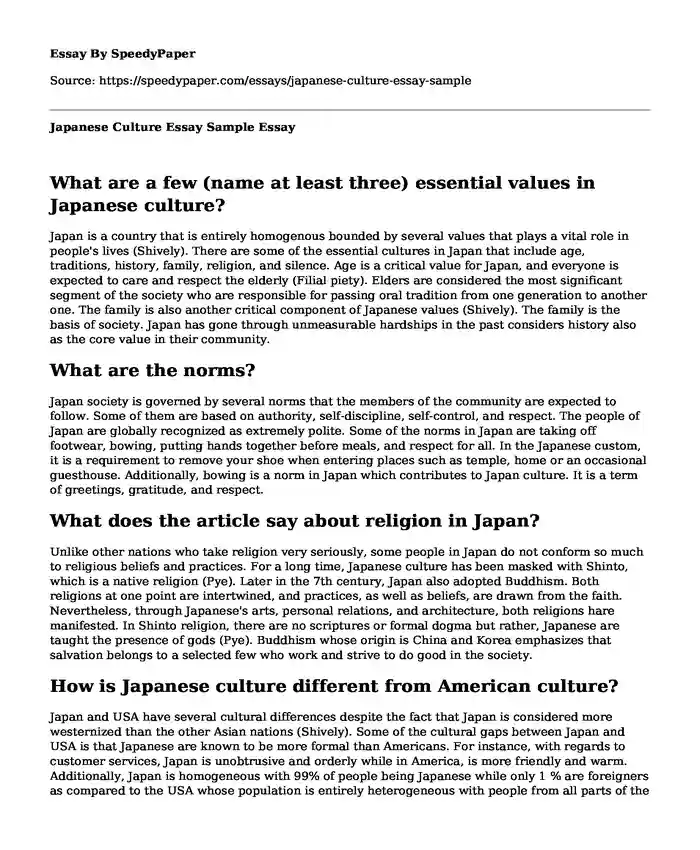What are a few (name at least three) essential values in Japanese culture?
Japan is a country that is entirely homogenous bounded by several values that plays a vital role in people's lives (Shively). There are some of the essential cultures in Japan that include age, traditions, history, family, religion, and silence. Age is a critical value for Japan, and everyone is expected to care and respect the elderly (Filial piety). Elders are considered the most significant segment of the society who are responsible for passing oral tradition from one generation to another one. The family is also another critical component of Japanese values (Shively). The family is the basis of society. Japan has gone through unmeasurable hardships in the past considers history also as the core value in their community.
What are the norms?
Japan society is governed by several norms that the members of the community are expected to follow. Some of them are based on authority, self-discipline, self-control, and respect. The people of Japan are globally recognized as extremely polite. Some of the norms in Japan are taking off footwear, bowing, putting hands together before meals, and respect for all. In the Japanese custom, it is a requirement to remove your shoe when entering places such as temple, home or an occasional guesthouse. Additionally, bowing is a norm in Japan which contributes to Japan culture. It is a term of greetings, gratitude, and respect.
What does the article say about religion in Japan?
Unlike other nations who take religion very seriously, some people in Japan do not conform so much to religious beliefs and practices. For a long time, Japanese culture has been masked with Shinto, which is a native religion (Pye). Later in the 7th century, Japan also adopted Buddhism. Both religions at one point are intertwined, and practices, as well as beliefs, are drawn from the faith. Nevertheless, through Japanese's arts, personal relations, and architecture, both religions hare manifested. In Shinto religion, there are no scriptures or formal dogma but rather, Japanese are taught the presence of gods (Pye). Buddhism whose origin is China and Korea emphasizes that salvation belongs to a selected few who work and strive to do good in the society.
How is Japanese culture different from American culture?
Japan and USA have several cultural differences despite the fact that Japan is considered more westernized than the other Asian nations (Shively). Some of the cultural gaps between Japan and USA is that Japanese are known to be more formal than Americans. For instance, with regards to customer services, Japan is unobtrusive and orderly while in America, is more friendly and warm. Additionally, Japan is homogeneous with 99% of people being Japanese while only 1 % are foreigners as compared to the USA whose population is entirely heterogeneous with people from all parts of the world. Furthermore, bowing in Japan is a norm while in the US, shaking of hands id dominant. American people are compassionate in politics are compared to Japanese who despite being nationalistic are no so political. The people of Japan have remarkable punctuality and discipline as compared to the American people. In Japan, the central religions are Buddhism and Shinto while in America the major one is Christianity.
How is Japanese culture similar to American culture?
Even though American and Japanese culture has a vast difference, there exist some similarities. Weddings happen in both countries which can be structured, extravagant or formal. In both nations, individuals can choose to get married in the church. Also, in both countries have the bests schools globally, and non-residents are required to take second language classes. Both countries eat vegetables and fruits and also have fast foods. Sports in both nations are trendy and highly recommended for students. Both cultures also emphasize the importance of student's participation in school activities.
Work cited
Pye, Michael. "Shinto, primal religion and international identity." Marburg Journal of Religion 1.1 (2015).
Shively, Donald H., ed. Tradition and modernization in Japanese culture. Princeton University Press, 2015.
Cite this page
Japanese Culture Essay Sample. (2022, Mar 09). Retrieved from https://speedypaper.com/essays/japanese-culture-essay-sample
Request Removal
If you are the original author of this essay and no longer wish to have it published on the SpeedyPaper website, please click below to request its removal:
- Should U.S Weaponize Space? Free Essay Sample
- Free Essay on Classical Argument on American Dream and Education in America
- Essay Sample on Nursing Practitioners and the Integral Knowledge
- Movie Review Essay Example: Dreams and Coffee and Cigarettes
- Free Essay on Modern American History - Lynching in the South
- Free Essay Example: Analysis of Dax's Case
- Essay Sample on Renting vs Buying
Popular categories





